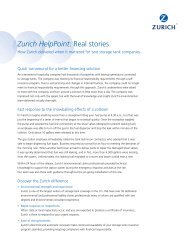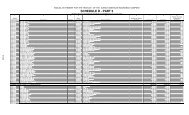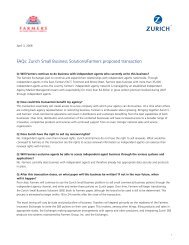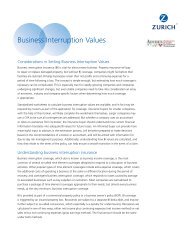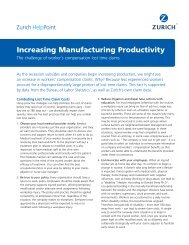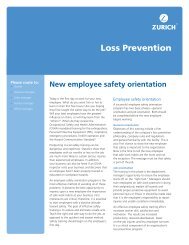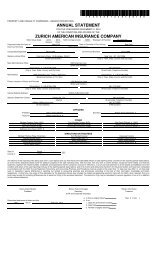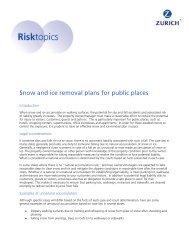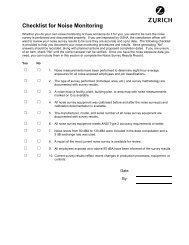Know the risks - Zurich
Know the risks - Zurich
Know the risks - Zurich
You also want an ePaper? Increase the reach of your titles
YUMPU automatically turns print PDFs into web optimized ePapers that Google loves.
agents, or servants of <strong>the</strong> [bank] to violate” <strong>the</strong> statute in question. Courts havesaid that a deliberate refusal to investigate that which <strong>the</strong> director has a dutyto investigate is tantamount to an intentional violation of <strong>the</strong> law, subjectinga director to personal liability for resulting losses. 26 Accordingly, bank directorsshould familiarize <strong>the</strong>mselves with <strong>the</strong> laws applicable to national banks in orderto recognize when <strong>the</strong>re may be a duty to investigate. Bank directors will not beexcused from this duty simply because <strong>the</strong>y lack an understanding of <strong>the</strong> pertinentstatutes and regulations.National banks are subject to limitations on <strong>the</strong> amount <strong>the</strong>y may lend to a singleborrower based on <strong>the</strong> bank’s capital and surplus and a national bank may not makea loan secured by its own stock. Bank directors who knowingly violate or knowinglypermit violations of any such limitations may be personally liable under <strong>the</strong> NationalBank Act. 27A wide array of o<strong>the</strong>r statutory and regulatory provisions govern <strong>the</strong> operation ofdepository institutions, including:• Depository institutions must maintain certain specified reserves and are subject torestrictions on paying dividends. 28• Depository institutions must make periodic reports as required by law. 29• Loans to “insiders” must be made on substantially <strong>the</strong> same terms, includinginterest rates and collateral, as those prevailing at <strong>the</strong> time for comparabletransactions with o<strong>the</strong>r persons and must not involve more than <strong>the</strong> normal risk ofrepayment or present o<strong>the</strong>r unfavorable features. 30• Depository institutions may not engage in impermissible “tying” arrangements. 31Directors who violate or participate in violations of those statutes and regulationscould be liable to <strong>the</strong> same extent as <strong>the</strong> financial institution.Regulatory Examinations26 Corsicana National Bank v. Johnson, supra at71-72; Michelsen v. Penney, 135 F.2d 409, 420(2d Cir. 1943).27 See, e.g., del Junco v. Conover, 682 F.2d 1338,1341-42 (9th Cir. 1982), cert. denied 103 S.Ct.786 (1983).28 12 U.S.C. § 60.29 12 U.S.C. § 161. See, e.g., Chesbrough v.Woodworth, 244 U.S. 72, 76 (1917); Harmsenv. Smith, 542 F.2d 496, 500 (9th Cir., 1976).30 12 U.S.C. § 375b(2)(a).31 12 U.S.C. §§ 1971, et seq. “Tying” isconditioning credit or <strong>the</strong> availability ofo<strong>the</strong>r services upon a customer’s agreementto engage in additional credit or servicetransactions with <strong>the</strong> bank or its affiliates.An examination report may be <strong>the</strong> most important vehicle for <strong>the</strong> ongoing regulatorysupervision and enforcement of <strong>the</strong> duties of depository institutions and <strong>the</strong>irdirectors. In making periodic examinations, <strong>the</strong> regulator will assess <strong>the</strong> quality of <strong>the</strong>institution’s assets, match assets with liabilities to evaluate liquidity and earnings, andreview management practices and capabilities. The report will specify any concerns<strong>the</strong> regulator may have with respect to <strong>the</strong> institution’s operations and may makerecommendations or suggest goals for <strong>the</strong> institution to pursue. Directors shouldreview carefully all examination reports to inform <strong>the</strong>mselves of <strong>the</strong> examiner’sanalysis of <strong>the</strong> institution’s operations and to ensure that management is acting tocorrect any identified problems.FIRREAIn 1989, Congress enacted <strong>the</strong> Financial Institutions Reform, Recovery andEnforcement Act of 1989 (FIRREA) in response to <strong>the</strong> rise in failures of depositoryinstitutions. FIRREA enhanced <strong>the</strong> enforcement powers of <strong>the</strong> Federal Deposit10Financial institutions guide



